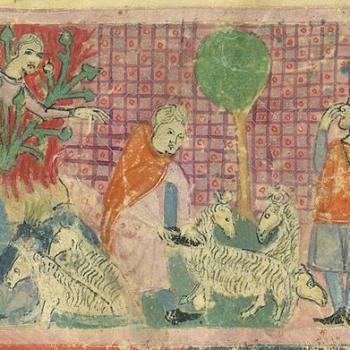Lectionary Reflections on 2 Samuel 11:26-12:13a
Sunday, August 5, 2012
This week David gets what he has coming to him from a most unlikely source. First, a quick summary of where we are in the story may be useful. David has slept with another man's wife and she has gotten pregnant. He has called the cuckolded husband back from the battlefield, where he is fighting on behalf of the king himself. David urges him to go to his house and sleep with the pregnant wife to make it look as though the baby is not David's after all. But the husband, Uriah, refuses to go sleep with his wife, Bathsheba. He claims that enjoying such pleasure and comfort, while his men are living and dying in the fields of war, would be a great evil—both against God and also against his king.
Finally, David is forced to arrange a murder plot with his general Joab that works to perfection. Uriah is killed in battle, along with several other soldiers in order to cover over the foul deed (Joab added that last wrinkle, since David's own plan to have Uriah killed would have involved only his death, a fact that might have proved very suspicious to the surviving troops). Joab then selects a messenger to tell David of what has happened, but warns the man that David can be very emotional when receiving bad news. When an Amalekite man brings David news of the death of Saul and claims to have killed the old king himself, David has the messenger killed on the spot! So Joab counsels the messenger to tell the story of the battle, and if the king's anger rises, simply state that Uriah too has been killed. Joab implies that that welcome news will quickly cool the king off.
But when the messenger comes into the presence of the fabled David, he blurts out the fact of Uriah's death before the king has any chance to express rage or sorrow of any kind. Instead, the king is completely calm, and says coldly, "Do not let the matter trouble you, for the sword devours now one and now another; press your attack on the city and overthrow it." Oh, (and about Joab) "encourage him." (2 Sam 11:25) In other words, the adulterous and lying murderer says to his long-time general, "Nice job! It worked beautifully."
"When the wife of Uriah heard that her husband was dead, she lamented for him. When the mourning days were over (one gets the impression that the rituals were kept only to the letter and not one minute longer than publically necessary), David brought her to his house, she became his wife, and bore him a son." (2 Sam 11:26-27) And then follows a most unusual phrase in this harrowing tale: "The thing that David had done was evil in the eyes of YHWH." (2 Sam 11:27b) Very seldom in the long story of Saul, Samuel, and David do we hear such a direct intrusion by the narrator. It informs us of exactly how readers should evaluate the behavior of a character. In fact, it is fair to say that the Bible quite rarely directs its readers in this way. It is usually up to us to supply such evaluative ideas. But not here.
YHWH is plainly disgusted by the Mafioso actions of the man who was presumably "God's favorite." The prophet Nathan is sent to announce God's reactions to David, who is now luxuriating in the presence of his new wife and bouncing son. He's feeling that he has gotten away with shattering fully four of the Ten Commandments, but just who is this Nathan? His name comes from the verb "to give" or "to place." YHWH has given and placed him in front of David to call the king to account. All of us should remember that the prophets of the Hebrew Bible do not show up until kings take hold in the land. In the Bible, kings generate prophets as surely as rain generates crops. Kings have this unerring propensity to go bad. Their power all too often is used for evil rather than for the good of the people or of God. Nathan is thus God's mouth. He is in fact the living example of the meaning of the word "prophet." He is a "mouthpiece," the spokesperson of YHWH.
Though we know nothing of his origin, he feels completely free to stride into the king's presence and tell to him a short story. It could be said that Nathan's story is the first example in history of a story sermon. Listen to the story:
There were two men in a certain city, one rich and the other poor. The rich man had vast flocks and herds, while the poor man had only one small ewe lamb that he had acquired. He brought it up and it grew up with him and his children. It would eat of his meager food, drink from his cup, lie in his lap; it was like a daughter to him. Now the rich man had a visitor, but he was reluctant to take one of his own flock and herd to prepare for his visitor, so he grabbed the poor man's lamb and served her to the guest who had come to him. (2 Sam 12:1-4)
Nathan has no need to ask the king what he would do to such a callous, rich man. David quickly became furious and said, "As YHWH lives, the man who does such things is a child of death! He shall restore the lamb four times over because he did this thing and because he had no pity." (2 Sam 12:6) Nathan fixes the king with his best prophetic stare and thunders a sentence that has echoed down the ages, "You are the man!" The story sermon has worked its will; David has been skewered on his own sword. Nathan proceeds to tell the king that his actions with Bathsheba and Uriah are nothing less than the actions of the rich man in the story. Even though YHWH has made David king and given him many wives and the rule over Israel and Judah, YHWH would have offered even more to him. (2 Sam 12:7-8)





